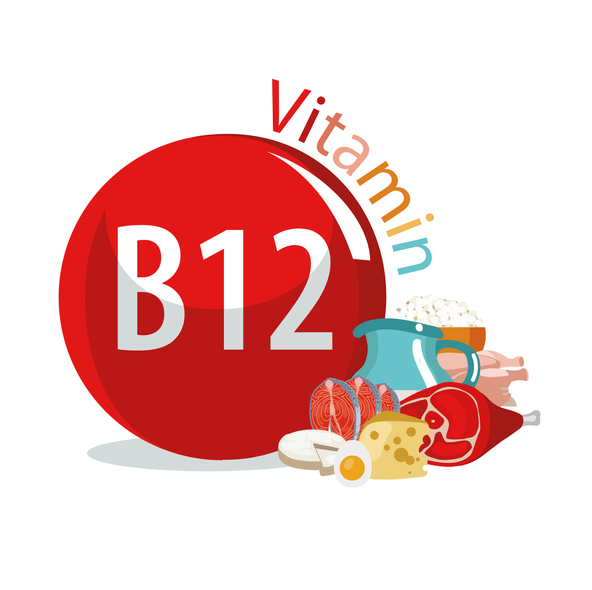Study Shows B12 Deficiency Increases Inflammation. Don’t Let This Block Your Path to Healthy & Happy Longevity

By Joy Stephenson-Laws, JD, Founder
Although the majority of my diet consists of plant-based foods, I’ve never really worried about developing a vitamin B12 deficiency because I eat some animal foods. This essential nutrient is present in many animal-based foods.
Vitamin B12 (one of the eight B vitamins) serves many purposes in the body, such as helping make DNA and red blood cells (that carry oxygen to your organs and give you energy and help prevent fatigue). B12 also helps keep your brain and immune system healthy and plays a role in preventing a type of anemia called megaloblastic anemia, which may leave you feeling tired and weak.
The reality, however, is that if we eventually get the privilege to become elderly (and, of course, the goal is happy and healthy longevity) we have to be mindful about B12 deficiency despite eating animal foods.
“Vitamin B12 deficiency is common among the elderly. Elderly people are particularly at risk of vitamin B12 deficiency because of the high prevalence of atrophic gastritis-associated food-cobalamin (vitamin B12) malabsorption, and the increasing prevalence of pernicious anaemia with advancing age,” according to a report published by the National Institutes of Health (NIH).
“The deficiency most often goes unrecognised because the clinical manifestations are highly variable, often subtle and non-specific, but if left undiagnosed the consequences can be serious.”
In addition to this, sudden appetite loss is more common after the age of 60. It is possible that at some point in life you might not find animal foods appetizing, putting you at risk of a B12 deficiency.

A recent study conducted in Spain found significant evidence suggesting that there is a link between vitamin B12 deficiency and chronic inflammation.
Let's review what inflammation is and when it becomes problematic.
There is acute inflammation, and then there is chronic inflammation.
Acute inflammation is a perfectly normal and healthy immune response. For example, when we burn our tongue on a hot cup of coffee or whack our knee against the stair banister, the pain and swelling we may feel is a result of inflammation.Luckily, this inflammation is usually short-lived and our bodies heal and then go back to normal.Acute inflammation actually helps the body fight off infections.
Chronic inflammation, hence the name, is inflammation that lasts several months or even years. And you can have chronic inflammation and not feel any pain at all. Chronic inflammation is essentially believed to be the root cause of many diseases, such as heart disease (the leading cause of death for both American men and women), diabetes and dementia, Americans face.
“Chronic inflammatory diseases are the most significant cause of death in the world. The World Health Organization (WHO) ranks chronic diseases as the greatest threat to human health,” reports the National Institutes of Health (NIH).
If you are overweight or obese, constantly stressed and sleep-deprived, follow a pro-inflammatory diet (lots of nutrient-void junk foods), drink heavily or smoke, you can pretty much guarantee you will have chronic inflammation throughout your body. It also appears being deficient in B12 promotes inflammation.
Researchers of the study mentioned earlier looked at how vitamin B12 influenced the levels of two molecules in the body that promote inflammation, according to this Medical Xpress report that discusses the study.
The research team looked at B12 levels of people who were part of a sample that followed the Mediterranean diet as a part of a program to see the effects of this diet and how it could prevent heart disease.
"Our study found that in general, the more vitamin B12 an individual has, the lower their inflammatory markers are—we call this an inverse relationship," said one of the co-authors of the study.
"With regards to vitamin B12 deficiency, we must point out that we did not specifically look at deficient individuals in this study. Nevertheless, our results raise some important questions. We already know that vitamin B12 deficiency can be harmful in many ways, but what we have reported here is a novel relationship. This might help us better understand why some unexplained symptoms of human B12 deficiency, like neurologic defects, occur."
These findings just emphasize what I have been advocating for for years. We must try to avoid nutritional deficiencies to be our healthiest selves. One way to determine if you have a nutritional deficiency or imbalance is to take a comprehensive nutrient test. If the test determines that you are not nutritionally balanced, a competent healthcare professional can work with you on making the necessary dietary changes and take quality supplements if necessary. To further educate yourself about vitamin B12, I highly recommend reading these previous pH blogs:
- Vegan Diet Not Only Risk for Vitamin B12 Deficiency. You May Have a Genetic Mutation
- Another Severe B12 Deficiency Makes The News. Don’t Let This Happen To You
- Don’t Let a B12 Deficiency Make Your Plant-Based Diet Damaging
- Young Woman’s Limbs Went Numb From Vitamin B12 Deficiency
- Part of the 50 & Up Club? You Need to Make Sure You’re Getting Enough Vitamin B12
Enjoy your healthy life!
Disclaimer: This article is not intended to provide medical advice. Please consult with your doctor or another competent healthcare practitioner to get specific medical advice for your situation.
The pH professional health care team includes recognized experts from a variety of health care and related disciplines, including physicians, attorneys, nutritionists, nurses, and certified fitness instructors. This team also includes the members of the pH Medical Advisory Board, which constantly monitors all pH programs, products, and services. To learn more about the pH Medical Advisory Board, click here.







